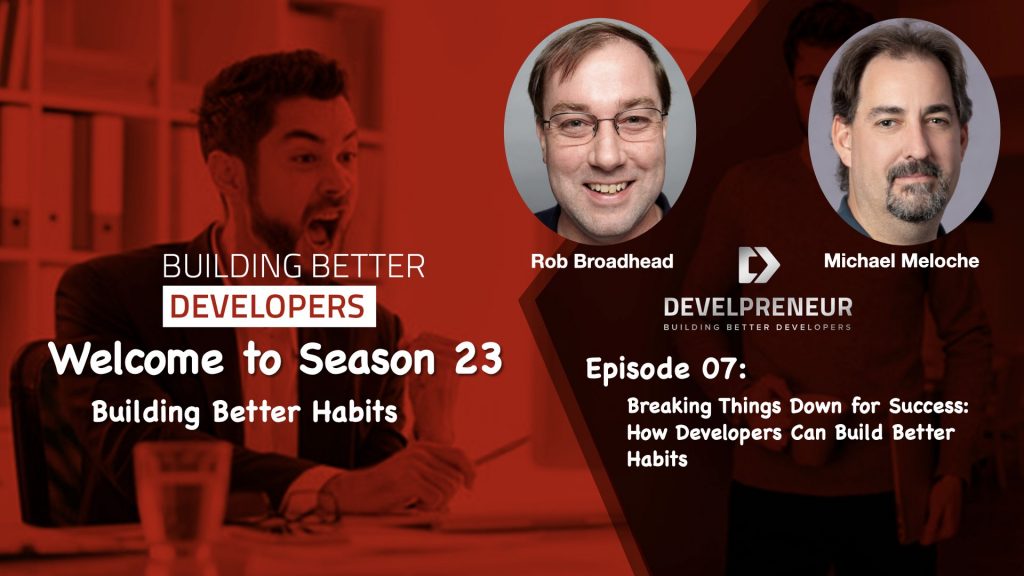Rob Broadhead and Michael Meloche host Episode 7 of Building Better Developers. They explore how to Breaking Things Down for Success. Their discussion centers on maintaining a personal backlog. This practical tool helps streamline both project management and professional growth. Through real examples, they demonstrate how this approach enhances productivity.
Breaking Down Projects into Manageable Chunks
Rob discusses how breaking things down can make overwhelming tasks more achievable. The hosts suggest starting with identifying core project elements. For developers, they recommend breaking features into backend, frontend, and testing components. Breaking down work helps maintain momentum and creates a systematic approach. This method prevents developers from feeling overwhelmed while ensuring thorough completion.
Creating a Personal Backlog for Better Task Management
The concept of a “personal backlog” is introduced as a way to stay organized and focused. The backlog serves as a repository for tasks that need to be completed but aren’t necessarily urgent. This approach helps ensure that, even if a task isn’t immediately tackled, it won’t fall through the cracks. Rob suggests regularly updating and consulting this backlog to prioritize tasks effectively. This makes it easier to pull items for daily or weekly to-do lists.
Building Daily Lists by Breaking Things Down
Another critical aspect discussed is the habit of making daily lists of actionable tasks. Rob and Michael recommend creating focused daily task lists with three to five items. They compare this practice to meal prepping, where planning prevents wasted effort. Breaking down weekly tasks in advance leads to smoother project execution. This approach helps developers maintain focus and avoid getting sidetracked. Proper planning eliminates unnecessary steps and improves overall efficiency.
Michael explains how backlogs help manage extended projects effectively. Developers can build focused to-do lists from their backlog items. This method allows for flexible scheduling while maintaining project order. The approach prevents common mistakes like tackling tasks in the wrong sequence.
Estimating and Prioritizing Tasks by Breaking Them Down
Rob and Michael discuss the importance of estimating task sizes for better time management. Breaking tasks into smaller pieces helps create more accurate time estimates. They recommend mixing small and medium tasks throughout the day. Larger tasks should be saved for periods of uninterrupted focus.
Using the Pomodoro Technique for Focused Task Completion
The hosts recommend using the Pomodoro technique to manage coding sessions effectively. Work intervals of 25 minutes are followed by short breaks. This method helps developers maintain focus and prevent burnout. Even brief breaks can boost productivity during intense coding work.
Integrating Testing by Breaking Down QA Tasks
Michael emphasizes testing throughout each project phase instead of leaving it until the end. He recommends adding testing tasks directly into the project backlog. This ensures quality checks become a natural part of development. Regular testing helps verify each phase meets requirements.
Weekly Challenge: Breaking Things Down to Build Better Habits
Rob challenges listeners to start using backlogs and break down their weekly tasks. Creating manageable daily lists should become a consistent habit. Regular backlog updates help maintain steady progress. This approach prevents burnout while keeping development work efficient and sustainable.
Rob and Michael invite listeners to share their task management experiences online. They emphasize starting with small, consistent improvements. These daily steps help developers build better work habits. Good task management leads to increased focus and development success.
Stay Connected: Join the Developreneur Community
We invite you to join our community and share your coding journey with us. Whether you’re a seasoned developer or just starting, there’s always room to learn and grow together. Contact us at [email protected] with your questions, feedback, or suggestions for future episodes. Together, let’s continue exploring the exciting world of software development.

